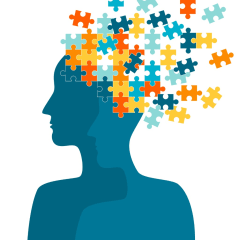Your Course to Healing: Insights from the Best Psychologist in Delhi
Your Course to Healing: Insights from the Best Psychologist in Delhi
Blog Article
Psych Treatment: A Comprehensive Guide to Outcomes and strategies

Cognitive-Behavioral Treatment
Cognitive-Behavioral Therapy (CBT) is an extensively utilized psychotherapeutic strategy that focuses on recognizing and changing inefficient reasoning and behavior patterns. Created in the 1960s by Aaron T. Beck, CBT combines behavior and cognitive theories to address various psychological health concerns, consisting of clinical depression, stress and anxiety, and stress-related disorders.
CBT is defined by its structured, goal-oriented nature. Therapy generally involves a joint procedure in between the specialist and customer, where specific problems are determined, and useful strategies are established to resolve them. Techniques such as cognitive restructuring, direct exposure treatment, and skill-building workouts are typically utilized. Cognitive restructuring entails difficult and modifying negative idea patterns, while exposure treatment aims to lower worry and anxiousness with gradual direct exposure to feared things or situations.
Evidence-based study supports the efficiency of CBT for a vast variety of emotional disorders - Best Psychologist in Delhi. Its focus on skill acquisition and self-help methods equips clients to proceed progression separately after treatment wraps up. The flexibility and efficiency of CBT have made it a foundation in contemporary psychotherapeutic technique
Psychodynamic Strategies
Rooted in the very early theories of Sigmund Freud, psychodynamic approaches concentrate on exploring the unconscious mind and its influence on behavior and feelings. These methods aim to discover concealed thoughts and feelings that might be driving maladaptive behaviors and emotional distress. Central to this method is the concept of inner problem, frequently stemming from unsolved previous experiences, particularly those from youth.
Therapists using psychodynamic methods employ numerous crucial approaches, consisting of totally free association, where clients are encouraged to speak easily to disclose unconscious material, and desire analysis, which translates the latent material of dreams. Additionally, the exploration of transference and countertransference dynamics within the healing partnership is vital. These communications can give understandings right into the individual's interior world and relational patterns.
Psychodynamic therapy is normally longer-term compared to other techniques, providing a deep and detailed understanding of the person's psyche. Research study suggests that it can be especially effective for intricate mental wellness problems, such as character conditions and chronic anxiety. By promoting self-awareness and psychological insight, psychodynamic therapy looks for to bring unconscious material to consciousness, making it possible for people to accomplish long lasting and purposeful modification in their lives.
Humanistic Techniques
Building on the foundations laid by psychodynamic methods, humanistic techniques provide an unique perspective concentrated on private possible and self-actualization. Originating in the mid-20th century, these methods focus on the inherent benefits and development possibility of people, emphasizing a holistic sight of human experience. Trick figures such as Carl Rogers and Abraham Maslow have actually significantly affected this therapeutic strategy, which incorporates methods like client-centered treatment and Gestalt therapy.
Client-centered therapy, established by Rogers, plays a pivotal function in humanistic methods. The therapist's duty is even more of a facilitator than an authority, encouraging customers to harness their internal sources for healing.
Gestalt treatment, an additional important humanistic method, stresses present moment recognition and the combination of mind and body. By concentrating on the "present moment," clients gain better understanding into their current feelings and actions. Techniques such as role-playing and guided visualization are usually utilized to aid clients get a deeper understanding of themselves, inevitably causing improved self-awareness and fulfillment.
Integrative Therapies
Integrative treatments stand for a synthesis of numerous restorative strategies tailored to satisfy the unique requirements of each client. This technique recognizes the complexity of human psychology and the diverse nature of psychological health problems. By incorporating aspects from different schools of psychiatric therapy-- such as cognitive-behavioral therapy (CBT), psychodynamic therapy, and humanistic methods-- integrative therapies supply a more alternative and adaptable therapy paradigm.
Practitioners of integrative treatment analyze each client's particular demands, symptoms, and personal history to devise a tailored therapy strategy. This individualized technique boosts the potential for healing success by dealing with the source of psychological distress and promoting total health. Techniques could include mindfulness workouts, cognitive restructuring, and emotional processing, each chosen to target different facets of the customer's concerns.
Moreover, integrative treatments emphasize the restorative relationship, watching the client-therapist bond as a crucial part of efficient therapy. This relationship cultivates a helpful setting where customers really feel secure to check out and address their concerns. The versatility of integrative therapies makes them suitable for a wide variety of problems, consisting of anxiety, clinical depression, injury, and social difficulties, visit this website therefore enhancing their applicability and performance in diverse clinical settings.

Gauging Therapy End Results
Evaluating the effectiveness of psychotherapy is essential for both medical professionals and customers to make sure that the therapy is producing the preferred outcomes. To accomplish this, numerous techniques and devices are employed to gauge treatment results methodically. Standardized analysis tools, such as the Beck Anxiety Supply (BDI) and the Generalized Anxiety Disorder 7 (GAD-7), provide quantitative data on signs and symptom seriousness and changes in time.
In addition to standard tools, qualitative methods like customer self-reports and professional meetings use valuable understandings right into the individual experiences and regarded progression of customers. On a regular basis arranged assessments, normally at the beginning, middle, and Homepage end of therapy, assistance in tracking the trajectory of renovation or recognizing locations needing modification.
Result measurement is not restricted to signs and symptom decrease; it additionally encompasses practical improvements in life, such as far better social relationships, increased work efficiency, and improved overall health. Modern improvements in electronic health have presented mobile applications and online systems that facilitate real-time tracking and comments, even more improving the evaluation process.
Inevitably, a detailed method to gauging treatment end results makes certain that restorative treatments are efficient, effective, and customized to satisfy the specific demands of clients, therefore enhancing the total restorative experience.
Conclusion
Humanistic techniques focus on individual development and self-actualization, while integrative therapies combine multiple methods for customized therapy strategies. Evaluating therapy end results with standard evaluations and qualitative techniques makes sure a detailed understanding of effectiveness, ultimately directing clients toward withstanding psychological wellness improvements.
From the structured technique of Cognitive-Behavioral Therapy (CBT) to the deep exploration of the subconscious in psychodynamic treatment, each method brings distinct advantages. Its emphasis on ability acquisition and self-help strategies empowers clients to continue progression independently after treatment concludes (Best Psychologist in Delhi). Trick figures such as Carl Rogers and Abraham Maslow have significantly affected this restorative technique, which incorporates methods like client-centered treatment and Gestalt treatment

Report this page